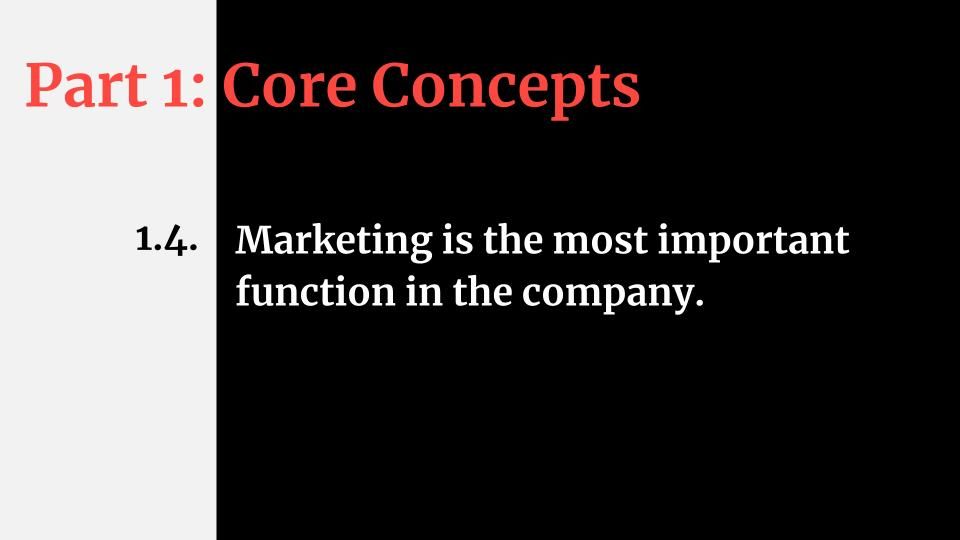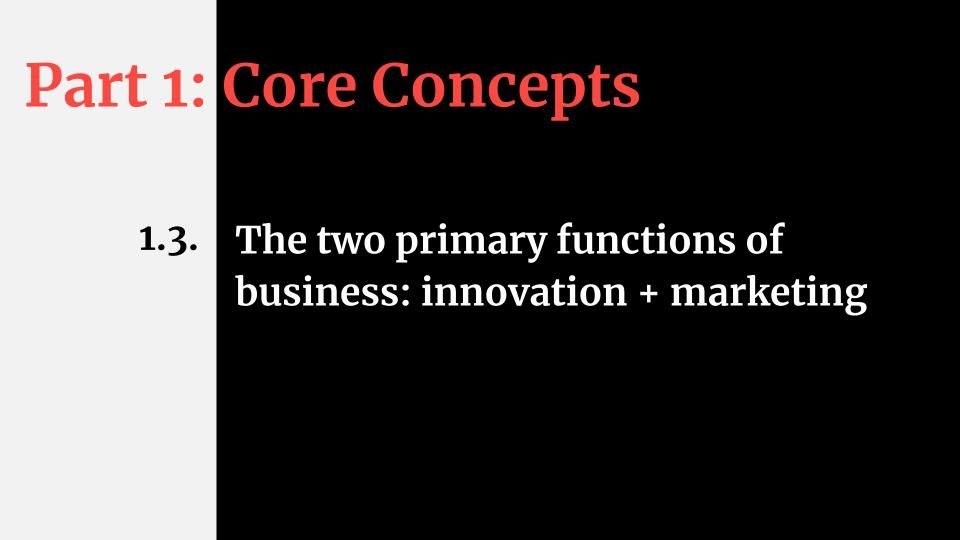1.4. Marketing is the most important function in the company.

It's a very common myth in Silicon Valley that the best marketing strategy is a great product. Meaning, if you build a great product customers will find you, share your product with friends, and stay with you. This is why the emphasis of almost every startup is on engineering and product design. Let's be clear — product matters. A lot. Even a brilliant marketing strategy will fail if your product isn't any good. If it doesn't relieve the pain or satisfy the need or desire, it won’t sell.
On the other hand, a great product alone, without marketing, doesn't guarantee your company's success. The greatest products that were ever created needed strong marketing to get initial customers, capture the market, and more importantly, collect feedback from the market and customers on how to improve the product. There are multiple examples of great products that required great marketing. These examples are so overused that I would rather skip them for the sake of brevity. Let's just point out that one of the best products released in the last two decades — the iPhone — required a marketing genius: Steve Jobs. Steve viewed marketing as a crucial element of innovation because it spread ideas to a wider audience.
Not everyone thinks that marketing is important. Even entrepreneurial icons don’t always realize the importance of marketing. In one of his interviews, Elon Musk said that Tesla spends almost no money on marketing. This is a misleading statement because it overlooks the fact that Elon's personal brand and a huge following on Twitter are basically Tesla's marketing channels. If you are a founder with a Jesus-like following, with over 25 million people listening to every word you say then, sure, you might not not need "other" marketing investments. Everything you say becomes news in itself. But whether Musk is aware of this or not, even an amazing product needs adequate marketing support. It won't be surprising to find out that advertising "a zero marketing budget" is good marketing in itself.
But let's take it a little further and argue that every new venture starts nowhere else but in marketing. It could sound like an exaggeration but let's think about how we come up with startup ideas.
Let's say you want to build a product and start a company. Before the first prototype is created and even the first line of code is written, you, as founder, make some assumptions about the market and your target audience. Maybe you want to build this product because you personally experienced the problem or because you think a certain technology or trend opens up a lucrative opportunity. A close analysis reveals that before starting a new venture, the founder makes assumptions about who the customers will be, what pain they have, and whether the demand will be sufficient to produce new products cost-effectively. Then, they act on these assumptions when building the first minimum valuable product (MVP). Before the innovation starts to take shape, new product ideas are drawn from the assumption of the market and target customers.
Whether we are conscious of it or not, every new venture starts with marketing because every venture starts with assumptions of who the potential customers are, what needs they have, and whether (and how much) they will be willing to pay for the solution.
For example, you want to build a corner grocery store. The reason you think it will work out is that you know people living in this area and you know the location. You credibly believe that there is a need that could be satisfied with a new kind of store. In the same way, when you start building a new software-as-a-service (SaaS) solution you are guessing who the customer will be and what pain you are relieving. In both instances, you are doing marketing analysis, even if it's just an unconscious exercise.
Every business idea starts with some basic assumptions about customers, their needs, and the market in general. It's the same to say that every business idea comes from marketing. That's why every company is born in marketing and every newly developed product includes certain assumptions about the market and a customer. So, whether you realize it or not, marketing is a core function of every business.
Many startups spend time talking to potential customers and analyzing their needs before starting product development or releasing a product. And even if companies start with building a product, they still act on the marketing assumptions.
It’s a marketing function to understand the market well enough to know what customers need or want to address, with what combination of products and services, and how to find an effective distribution channel. Hence, marketing concerns about how a company, person, or organization interacts with the market.
Any way you look at it, innovation starts with marketing.
Checkout my course on How to Conduct Customer Interviews
Read the previous chapter


